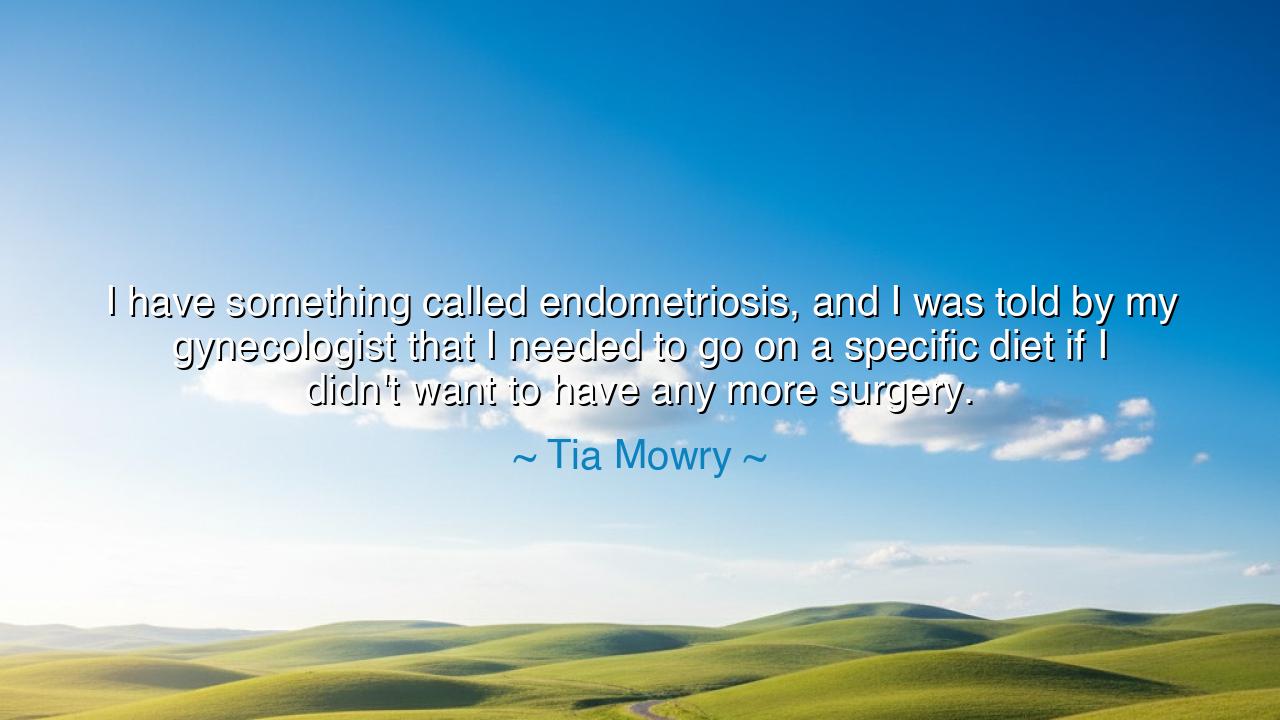
I have something called endometriosis, and I was told by my
I have something called endometriosis, and I was told by my gynecologist that I needed to go on a specific diet if I didn't want to have any more surgery.






In the heartfelt words of Tia Mowry, we find a truth both personal and universal: “I have something called endometriosis, and I was told by my gynecologist that I needed to go on a specific diet if I didn't want to have any more surgery.” Though spoken softly, this statement resounds with the courage of a woman reclaiming power over her own body. Within it lies the eternal wisdom that the human form—fragile, mysterious, and divine—requires not only medicine from without, but discipline, nourishment, and reverence from within. It is a testimony not merely of illness, but of awakening; a story of how pain, when met with understanding, can become a teacher rather than a tyrant.
In ancient times, healers understood the sacred bond between food and healing. The Greek physician Hippocrates, whom many call the father of medicine, declared, “Let food be thy medicine and medicine be thy food.” This was not metaphor, but law—a recognition that what enters the body shapes the destiny of both flesh and spirit. Tia Mowry’s revelation is a modern echo of that ancient truth. When she faced the shadow of endometriosis, a condition that torments countless women with unseen suffering, she did not surrender to despair. Instead, she turned inward—to the wisdom of her own body, to the nourishment of the earth, and to the power of choice. For in choosing a new diet, she chose a new path: one of renewal, alignment, and hope.
Endometriosis—the growth of uterine tissue beyond its home—is a cruel reminder of imbalance. It is the body crying out in rebellion, seeking restoration of harmony. The ancients would have called such affliction a disorder of energies, a breaking of natural rhythm. And yet, even in pain, there is the possibility of rebirth. Tia’s decision to heal through food was not weakness, but defiance; not resignation, but transformation. She became both patient and healer, student and master, learning to listen to the silent wisdom of her body. Through careful nourishment and restraint, she sought to bring order where chaos reigned—to heal not only with medicine, but with mindfulness.
There is an old story told of a Japanese samurai who, after suffering great injury, was told by his healer to abandon the sword and take up gardening. At first, he raged against this command, seeing it as weakness. But as he tended the soil, he found peace in the rhythm of the earth and the balance of nourishment. In time, his strength returned—not only of body, but of spirit. He understood at last that discipline and healing are kin, and that tending to life—whether soil or flesh—requires patience, humility, and faith. So it is with Tia Mowry’s journey: the warrior who exchanged battle for balance, the fighter who found her strength in nourishment rather than struggle.
Tia’s quote also speaks to a greater truth for our time—that healing is not the sole dominion of doctors, but a partnership between wisdom and will. Medicine may repair, but it cannot replace the daily devotion of self-care. To live well is to live with awareness—to know that the foods we eat, the thoughts we cultivate, the rest we allow, and the peace we nurture all become part of our healing. She was told that if she did not change, surgery would await her again. And in that warning was hidden a gift: the chance to transform suffering into discipline, and discipline into freedom.
Her words are not merely a story of illness—they are a call to mindfulness. She reminds us that every bite is a choice, every act of care a step toward harmony. Diet, in her wisdom, is not punishment but power. It is a dialogue with one’s body, a daily offering of respect to the vessel that carries the soul. Just as the ancients fasted to purify both mind and flesh, so too can we learn to eat not merely for pleasure, but for purpose—to feed vitality, to quiet pain, and to honor the sacred balance within.
So let this be the lesson for all who hear: your body is not your enemy; it is your messenger. Listen to it. Feed it not with indulgence, but with intention. When pain speaks, do not silence it with bitterness, but answer it with wisdom. Healing begins when the spirit accepts responsibility for its own restoration. Choose what sustains you, not what destroys you. Seek balance, not perfection. Remember, as Tia Mowry learned, that the path to wellness is not only found in hospitals or prescriptions—but in the quiet, daily choices that honor the miracle of your existence.
For in the end, her quote is not just about endometriosis, nor about diet—it is about the eternal dialogue between suffering and wisdom, between the will to endure and the courage to transform. And to those who walk in pain or uncertainty, her story whispers across the ages: You are not powerless. The healing you seek begins at your own table, in your own hands, and in the choices you make each day.






AAdministratorAdministrator
Welcome, honored guests. Please leave a comment, we will respond soon